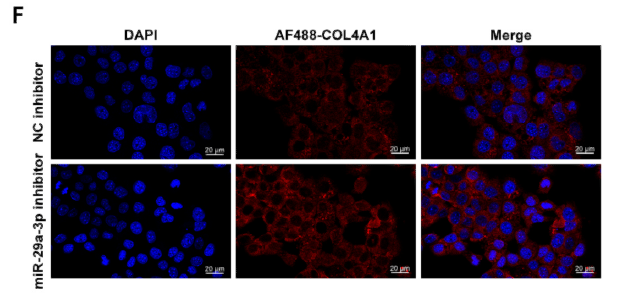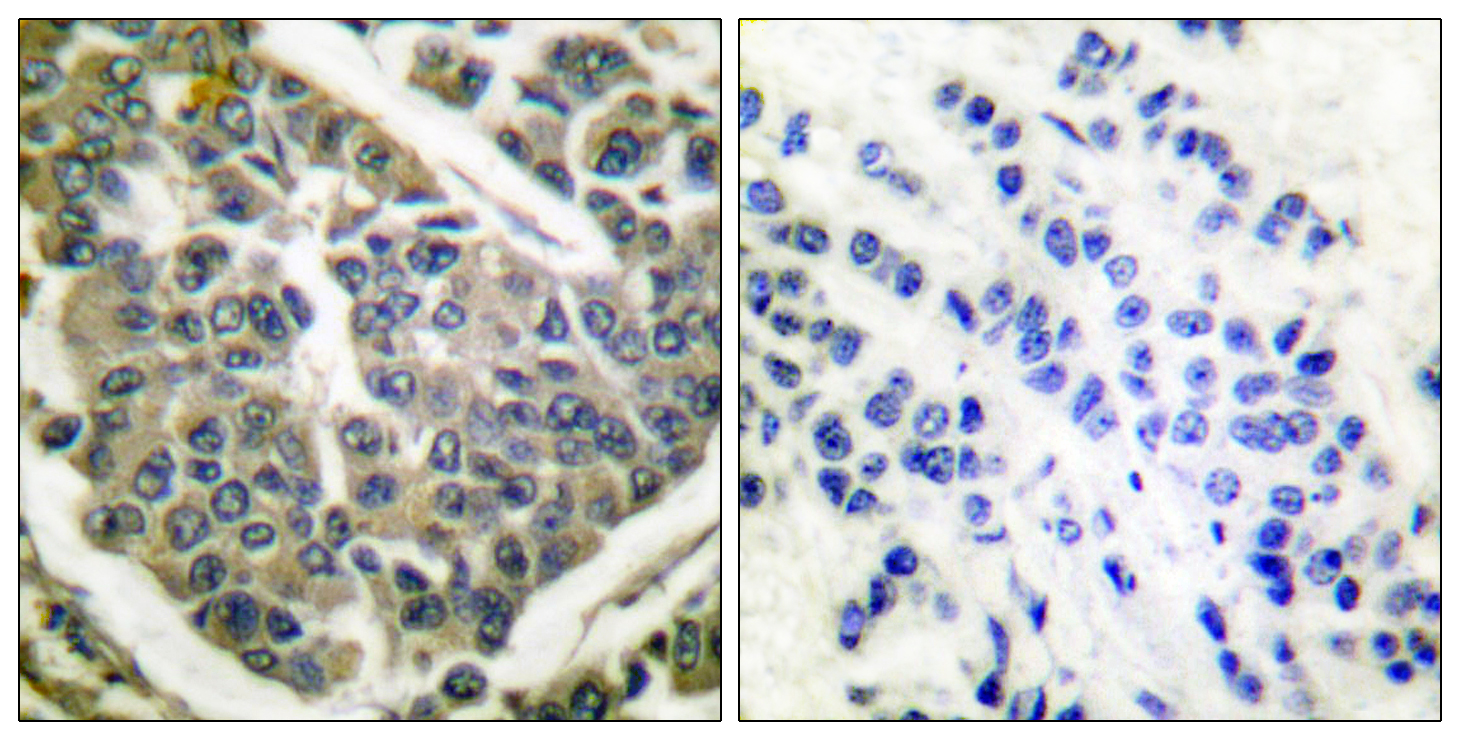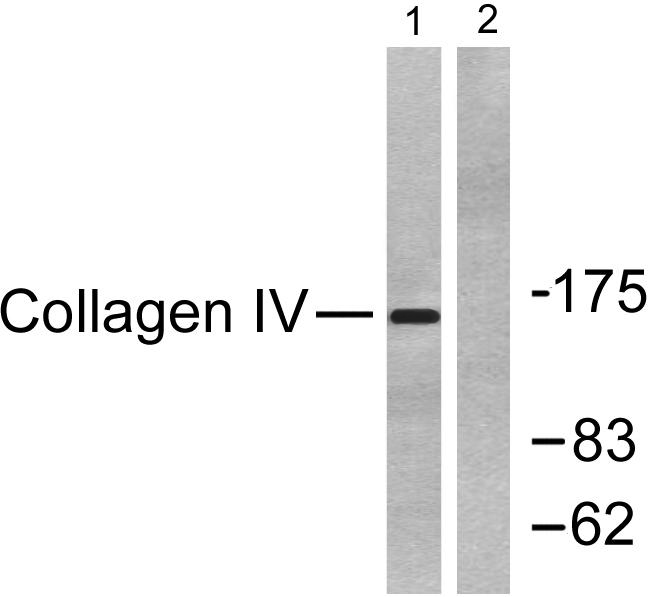- 靶点:
- Collagen IV
- 简介:
- >>PI3K-Akt signaling pathway;>>Focal adhesion;>>ECM-receptor interaction;>>Relaxin signaling pathway;>>AGE-RAGE signaling pathway in diabetic complications;>>Protein digestion and absorption;>>Amoebiasis;>>Human papillomavirus infection;>>Pathways in cancer;>>Small cell lung cancer
- 基因名称:
- COL4A1
- 蛋白名称:
- Collagen alpha-1(IV) chain
- Human Gene Id:
- 1282
- Human Swiss Prot No:
- P02462
- Mouse Gene Id:
- 12826
- Mouse Swiss Prot No:
- P02463
- 免疫原:
- The antiserum was produced against synthesized peptide derived from human Collagen IV. AA range:11-60
- 特异性:
- COL4A1 Polyclonal Antibody detects endogenous levels of COL4A1 protein.
- 组成:
- Liquid in PBS containing 50% glycerol, 0.5% BSA and 0.02% sodium azide.
- 来源:
- Polyclonal, Rabbit,IgG
- 稀释:
- WB 1:500 - 1:2000. IHC 1:100 - 1:300. ELISA: 1:20000.. IF 1:50-200
- 纯化工艺:
- The antibody was affinity-purified from rabbit antiserum by affinity-chromatography using epitope-specific immunogen.
- 浓度:
- 1 mg/ml
- 储存:
- -15°C to -25°C/1 year(Do not lower than -25°C)
- 其他名称:
- COL4A1;Collagen alpha-1(IV) chain
- 实测条带:
- 160kD
- 背景:
- This gene encodes a type IV collagen alpha protein. Type IV collagen proteins are integral components of basement membranes. This gene shares a bidirectional promoter with a paralogous gene on the opposite strand. The protein consists of an amino-terminal 7S domain, a triple-helix forming collagenous domain, and a carboxy-terminal non-collagenous domain. It functions as part of a heterotrimer and interacts with other extracellular matrix components such as perlecans, proteoglycans, and laminins. In addition, proteolytic cleavage of the non-collagenous carboxy-terminal domain results in a biologically active fragment known as arresten, which has anti-angiogenic and tumor suppressor properties. Mutations in this gene cause porencephaly, cerebrovascular disease, and renal and muscular defects. Alternative splicing results in multiple transcript variants. [provided by RefSeq, Dec 2014],
- 功能:
- disease:Defects in COL4A1 are a cause of brain small vessel disease with hemorrhage [MIM:607595]. Brain small vessel diseases underlie 20 to 30 percent of ischemic strokes and a larger proportion of intracerebral hemorrhages. Inheritance is autosomal dominant.,disease:Defects in COL4A1 are a cause of porencephaly type 1 [MIM:175780]; also known as encephaloclastic porencephaly. Porencephaly is a term used for any cavitation or cerebrospinal fluid-filled cyst in the brain. Porencephaly type 1 is usually unilateral and results from focal destructive lesions such as fetal vascular occlusion or birth trauma. Inheritance is autosomal dominant.,disease:Defects in COL4A1 are the cause of hereditary angiopathy with nephropathy, aneurysms, and muscle cramps (HANAC) [MIM:611773]. The clinical renal manifestations include hematuria and bilateral large cysts. Histologic analysis revealed complex bas
- 细胞定位:
- Secreted, extracellular space, extracellular matrix, basement membrane .
- 组织表达:
- Highly expressed in placenta.
Prenatal bisphenol S exposure induces hepatic lipid deposition in male mice offspring through downregulation of adipose-derived exosomal miR-29a-3p JOURNAL OF HAZARDOUS MATERIALS Guizhen Du IF Mouse AML12 hepatocytes
货号:YT1024
- June 19-2018
- WESTERN IMMUNOBLOTTING PROTOCOL
- June 19-2018
- IMMUNOHISTOCHEMISTRY-PARAFFIN PROTOCOL
- June 19-2018
- IMMUNOFLUORESCENCE PROTOCOL
- September 08-2020
- FLOW-CYTOMEYRT-PROTOCOL
- May 20-2022
- Cell-Based ELISA│解您多样本WB检测之困扰
- July 13-2018
- CELL-BASED-ELISA-PROTOCOL-FOR-ACETYL-PROTEIN
- July 13-2018
- CELL-BASED-ELISA-PROTOCOL-FOR-PHOSPHO-PROTEIN
- July 13-2018
- Antibody-FAQs
- 产品图片

- Prenatal bisphenol S exposure induces hepatic lipid deposition in male mice offspring through downregulation of adipose-derived exosomal miR-29a-3p JOURNAL OF HAZARDOUS MATERIALS Guizhen Du IF Mouse AML12 hepatocytes
.jpg)
- Western Blot analysis of mouse-musle cells using COL4A1 Polyclonal Antibody diluted at 1:500

- Immunohistochemistry analysis of paraffin-embedded human breast carcinoma tissue, using Collagen IV Antibody. The picture on the right is blocked with the synthesized peptide.

- Western blot analysis of lysates from HeLa cells, using Collagen IV Antibody. The lane on the right is blocked with the synthesized peptide.



